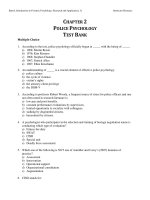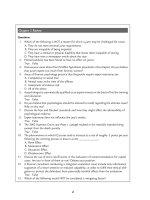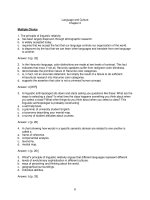The european union a very short introduction (very short introductions), 3rd edition
Bạn đang xem bản rút gọn của tài liệu. Xem và tải ngay bản đầy đủ của tài liệu tại đây (2.88 MB, 151 trang )
Praise for earlier editions of
The European Union: A Very Short Introduction
‘This up-to-date and accessible guide to the EU, with an authorship team of academic and practitioner experts, will be of
benefit to anyone who wants to understand how today’s EU works and why it has as many problems as achievements. A
very welcome book.’
Alex Warleigh-Lack
‘John Pinder writes straightforwardly and beautifully clearly . . . He has done an extraordinary job of compressing the
history, and the book is absolutely up to date.’
Helen Wallace
‘John Pinder is in a class of his own. He brings clarity and vision to what is too often complicated and obscure. He causes
both friend and foe to wonder what a reformed and strengthened Union could achieve for all Europe and for the wider
world.’
Andrew Duff, MEP, Constitutional Affairs Spokesman,
European Liberal Democrats
‘ . . . indispensable not only for beginners but for all interested in European issues. Pithy, lucid and accessible it covers
recent history, institutions, and policies, as well as future developments.’
Rt. Hon. Giles Radice, MP
‘ . . . it not only lives up to but exceeds the promise of its title. This is in fact “The European Union – A Very Short,
Useful and Straightforward Guide”.’
Independent on Sunday
‘invaluable’
William Keegan, Observer
Great Clarendon Street, Oxford, OX2 6DP,
United Kingdom
Oxford University Press is a department of the University of Oxford.
It furthers the University’s objective of excellence in research, scholarship,
and education by publishing worldwide. Oxford is a registered trade mark of
Oxford University Press in the UK and in certain other countries
© John Pinder and Simon Usherwood 2013
The moral rights of the authors have been asserted
First Edition published in 2001
Second Edition published in 2007
This Edition published 2013
Impression: 1
All rights reserved. No part of this publication may be reproduced, stored in
a retrieval system, or transmitted, in any form or by any means, without the
prior permission in writing of Oxford University Press, or as expressly permitted
by law, by licence or under terms agreed with the appropriate reprographics
rights organization. Enquiries concerning reproduction outside the scope of the
above should be sent to the Rights Department, Oxford University Press, at the
address above
You must not circulate this work in any other form
and you must impose this same condition on any acquirer
Published in the United States of America by Oxford University Press
198 Madison Avenue, New York, NY 10016, United States of America
British Library Cataloguing in Publication Data
Data available
ISBN 978–0–19–968169–3
Printed in Great Britain by
Ashford Colour Press Ltd, Gosport, Hampshire
Very Short Introductions available now:
ADVERTISING • Winston Fletcher
AFRICAN HISTORY • John Parker and Richard Rathbone
AGNOSTICISM • Robin Le Poidevin
AMERICAN POLITICAL PARTIES AND ELECTIONS • L. Sandy Maisel
THE AMERICAN PRESIDENCY • Charles O. Jones
ANARCHISM • Colin Ward
ANCIENT EGYPT • Ian Shaw
ANCIENT PHILOSOPHY • Julia Annas
ANCIENT WARFARE • Harry Sidebottom
ANGLICANISM • Mark Chapman
THE ANGLO-SAXON AGE • John Blair
ANIMAL RIGHTS • David DeGrazia
ANTISEMITISM • Steven Beller
THE APOCRYPHAL GOSPELS • Paul Foster
ARCHAEOLOGY • Paul Bahn
ARCHITECTURE • Andrew Ballantyne
ARISTOCRACY • William Doyle
ARISTOTLE • Jonathan Barnes
ART HISTORY • Dana Arnold
ART THEORY • Cynthia Freeland
ATHEISM • Julian Baggini
AUGUSTINE • Henry Chadwick
AUTISM • Uta Frith
BARTHES • Jonathan Culler
BESTSELLERS • John Sutherland
THE BIBLE • John Riches
BIBLICAL ARCHEOLOGY • Eric H. Cline
BIOGRAPHY • Hermione Lee
THE BOOK OF MORMON • Terryl Givens
THE BRAIN • Michael O’Shea
BRITISH POLITICS • Anthony Wright
BUDDHA • Michael Carrithers
BUDDHISM • Damien Keown
BUDDHIST ETHICS • Damien Keown
CAPITALISM • James Fulcher
CATHOLICISM • Gerald O’Collins
THE CELTS • Barry Cunliffe
CHAOS • Leonard Smith
CHOICE THEORY • Michael Allingham
CHRISTIAN ART • Beth Williamson
CHRISTIAN ETHICS • D. Stephen Long
CHRISTIANITY • Linda Woodhead
CITIZENSHIP • Richard Bellamy
CLASSICAL MYTHOLOGY • Helen Morales
CLASSICS • Mary Beard and John Henderson
CLAUSEWITZ • Michael Howard
THE COLD WAR • Robert McMahon
COMMUNISM • Leslie Holmes
CONSCIOUSNESS • Susan Blackmore
CONTEMPORARY ART • Julian Stallabrass
CONTINENTAL PHILOSOPHY • Simon Critchley
COSMOLOGY • Peter Coles
THE CRUSADES • Christopher Tyerman
CRYPTOGRAPHY • Fred Piper and Sean Murphy
DADA AND SURREALISM • David Hopkins
DARWIN • Jonathan Howard
THE DEAD SEA SCROLLS • Timothy Lim
DEMOCRACY • Bernard Crick
DESCARTES • Tom Sorell
DESERTS • Nick Middleton
DESIGN • John Heskett
DINOSAURS • David Norman
DIPLOMACY • Joseph M. Siracusa
DOCUMENTARY FILM • Patricia Aufderheide
DREAMING • J. Allan Hobson
DRUGS • Leslie Iversen
DRUIDS • Barry Cunliffe
THE EARTH • Martin Redfern
ECONOMICS • Partha Dasgupta
EGYPTIAN MYTH • Geraldine Pinch
EIGHTEENTH-CENTURY BRITAIN • Paul Langford
THE ELEMENTS • Philip Ball
EMOTION • Dylan Evans
EMPIRE • Stephen Howe
ENGELS • Terrell Carver
ENGLISH LITERATURE • Jonathan Bate
EPIDEMIOLOGY • Roldolfo Saracci
ETHICS • Simon Blackburn
THE EUROPEAN UNION • John Pinder and Simon Usherwood
EVOLUTION • Brian and Deborah Charlesworth
EXISTENTIALISM • Thomas Flynn
FASCISM • Kevin Passmore
FASHION • Rebecca Arnold
FEMINISM • Margaret Walters
FILM MUSIC • Kathryn Kalinak
THE FIRST WORLD WAR • Michael Howard
FORENSIC PSYCHOLOGY • David Canter
FORENSIC SCIENCE • Jim Fraser
FOSSILS • Keith Thomson
FOUCAULT • Gary Gutting
FREE SPEECH • Nigel Warburton
FREE WILL • Thomas Pink
FRENCH LITERATURE • John D. Lyons
THE FRENCH REVOLUTION • William Doyle
FREUD • Anthony Storr
FUNDAMENTALISM • Malise Ruthven
GALAXIES • John Gribbin
GALILEO • Stillman Drake
GAME THEORY • Ken Binmore
GANDHI • Bhikhu Parekh
GEOGRAPHY • John Matthews and David Herbert
GEOPOLITICS • Klaus Dodds
GERMAN LITERATURE • Nicholas Boyle
GERMAN PHILOSOPHY • Andrew Bowie
GLOBAL CATASTROPHES • Bill McGuire
GLOBAL WARMING • Mark Maslin
GLOBALIZATION • Manfred Steger
THE GREAT DEPRESSION AND THE NEW DEAL • Eric Rauchway
HABERMAS • James Gordon Finlayson
HEGEL • Peter Singer
HEIDEGGER • Michael Inwood
HIEROGLYPHS • Penelope Wilson
HINDUISM • Kim Knott
HISTORY • John H. Arnold
THE HISTORY OF ASTRONOMY • Michael Hoskin
THE HISTORY OF LIFE • Michael Benton
THE HISTORY OF MEDICINE • William Bynum
THE HISTORY OF TIME • Leofranc Holford-Strevens
HIV/AIDS • Alan Whiteside
HOBBES • Richard Tuck
HUMAN EVOLUTION • Bernard Wood
HUMAN RIGHTS • Andrew Clapham
HUME • A. J. Ayer
IDEOLOGY • Michael Freeden
INDIAN PHILOSOPHY • Sue Hamilton
INFORMATION • Luciano Floridi
INNOVATION • Mark Dodgson and David Gann
INTELLIGENCE • Ian J. Deary
INTERNATIONAL MIGRATION • Khalid Koser
INTERNATIONAL RELATIONS • Paul Wilkinson
ISLAM • Malise Ruthven
ISLAMIC HISTORY • Adam Silverstein
JOURNALISM • Ian Hargreaves
JUDAISM • Norman Solomon
JUNG • Anthony Stevens
KABBALAH • Joseph Dan
KAFKA • Ritchie Robertson
KANT • Roger Scruton
KEYNES • Robert Skidelsky
KIERKEGAARD • Patrick Gardiner
THE KORAN • Michael Cook
LANDSCAPES AND CEOMORPHOLOGY • Andrew Goudie and Heather Viles
LAW • Raymond Wacks
THE LAWS OF THERMODYNAMICS • Peter Atkins
LEADERSHIP • Keth Grint
LINCOLN • Allen C. Guelzo
LINGUISTICS • Peter Matthews
LITERARY THEORY • Jonathan Culler
LOCKE • John Dunn
LOGIC • Graham Priest
MACHIAVELLI • Quentin Skinner
MARTIN LUTHER • Scott H. Hendrix
THE MARQUIS DE SADE • John Phillips
MARX • Peter Singer
MATHEMATICS • Timothy Gowers
THE MEANING OF LIFE • Terry Eagleton
MEDICAL ETHICS • Tony Hope
MEDIEVAL BRITAIN • John Gillingham and Ralph A. Griffiths
MEMORY • Jonathan K. Foster
MICHAEL FARADAY • Frank A. J. L. James
MODERN ART • David Cottington
MODERN CHINA • Rana Mitter
MODERN IRELAND • Senia Paseta
MODERN JAPAN • Christopher Goto-Jones
MODERNISM • Christopher Butler
MOLECULES • Philip Ball
MORMONISM • Richard Lyman Bushman
MUSIC • Nicholas Cook
MYTH • Robert A. Segal
NATIONALISM • Steven Grosby
NELSON MANDELA • Elleke Boehmer
NEOLIBERALISM • Manfred Steger and Ravi Roy
THE NEW TESTAMENT • Luke Timothy Johnson
THE NEW TESTAMENT AS LITERATURE • Kyle Keefer
NEWTON • Robert Iliffe
NIETZSCHE • Michael Tanner
NINETEENTH-CENTURY BRITAIN • Christopher Harvie and H. C. G. Matthew
THE NORMAN CONQUEST • George Garnett
NORTHERN IRELAND • Marc Mulholland
NOTHING • Frank Close
NUCLEAR WEAPONS • Joseph M. Siracusa
THE OLD TESTAMENT • Michael D. Coogan
PARTICLE PHYSICS • Frank Close
PAUL • E. P. Sanders
PENTECOSTALISM • William K. Kay
PHILOSOPHY • Edward Craig
PHILOSOPHY OF LAW • Raymond Wacks
PHILOSOPHY OF SCIENCE • Samir Okasha
PHOTOGRAPHY • Steve Edwards
PLANETS • David A. Rothery
PLATO • Julia Annas
POLITICAL PHILOSOPHY • David Miller
POLITICS • Kenneth Minogue
POSTCOLONIALISM • Robert Young
POSTMODERNISM • Christopher Butler
POSTSTRUCTURALISM • Catherine Belsey
PREHISTORY • Chris Gosden
PRESOCRATIC PHILOSOPHY • Catherine Osborne
PRIVACY • Raymond Wacks
PROGRESSIVISM • Walter Nugent
PSYCHIATRY • Tom Burns
PSYCHOLOGY • Gillian Butler and Freda McManus
PURITANISM • Francis J. Bremer
THE QUAKERS • Pink Dandelion
QUANTUM THEORY • John Polkinghorne
RACISM • Ali Rattansi
THE REAGAN REVOLUTION • Gil Troy
THE REFORMATION • Peter Marshall
RELATIVITY • Russell Stannard
RELIGION IN AMERICA • Timothy Beal
THE RENAISSANCE • Jerry Brotton
RENAISSANCE ART • Geraldine A. Johnson
ROMAN BRITAIN • Peter Salway
THE ROMAN EMPIRE • Christopher Kelly
ROMANTICISM • Michael Ferber
ROUSSEAU • Robert Wokler
RUSSELL • A. C. Grayling
RUSSIAN LITERATURE • Catriona Kelly
THE RUSSIAN REVOLUTION • S. A. Smith
SCHIZOPHRENIA • Chris Frith and Eve Johnstone
SCHOPENHAUER • Christopher Janaway
SCIENCE AND RELIGION • Thomas Dixon
SCOTLAND • Rab Houston
SEXUALITY • Véronique Mottier
SHAKESPEARE • Germaine Greer
SIKHISM • Eleanor Nesbitt
SOCIAL AND CULTURAL ANTHROPOLOGY • John Monaghan and Peter Just
SOCIALISM • Michael Newman
SOCIOLOGY • Steve Bruce
SOCRATES • C. C. W. Taylor
THE SOVIET UNION • Stephen Lovell
THE SPANISH CIVIL WAR • Helen Graham
SPANISH LITERATURE • Jo Labanyi
SPINOZA • Roger Scruton
STATISTICS • David J. Hand
STUART BRITAIN • John Morrill
SUPERCONDUCTIVITY • Stephen Blundell
TERRORISM • Charles Townshend
THEOLOGY • David F. Ford
THOMAS AQUINAS • Fergus Kerr
TOCQUEVILLE • Harvey C. Mansfield
TRAGEDY • Adrian Poole
THE TUDORS • John Guy
TWENTIETH-CENTURY BRITAIN • Kenneth O. Morgan
THE UNITED NATIONS • Jussi M. Hanhimäki
THE U.S. CONCRESS • Donald A. Ritchie
UTOPIANISM • Lyman Tower Sargent
THE VIKINGS • Julian Richards
WITCHCRAFT • Malcolm Gaskill
WITTGENSTEIN • A. C. Grayling
WORLD MUSIC • Philip Bohlman
THE WORLD TRADE ORGANIZATION • Amrita Narlikar
WRITING AND SCRIPT • Andrew Robinson
Available soon:
LATE ANTIQUITY • Gillian Clark
MUHAMMAD • Jonathan A. Brown
GENIUS • Andrew Robinson
NUMBERS • Peter M. Higgins
ORGANIZATIONS • Mary Jo Hatch
VERY SHORT INTRODUCTIONS
VERY SHORT INTRODUCTIONS are for anyone wanting a stimulating and accessible way in to a
new subject. They are written by experts, and have been published in more than 25 languages
worldwide.
The series began in 1995, and now represents a wide variety of topics in history, philosophy,
religion, science, and the humanities. The VSI library now contains more than 300 volumes—a
Very Short Introduction to everything from ancient Egypt and Indian philosophy to conceptual art
and cosmology—and will continue to grow in a variety of disciplines.
VERY SHORT INTRODUCTIONS AVAILABLE NOW
For more information visit our website www.oup.co.uk/general/vsi/
John Pinder and Simon Usherwood
THE EUROPEAN UNION
A Very Short Introduction
Contents
Preface
Abbreviations
List of boxes
List of charts
List of illustrations
List of maps
1 What the EU is for
2 How the EU was made
3 How the EU is governed
4 Single market, single currency
5 Agriculture, regions, budget: conflicts over who gets what
6 Social policy, environmental policy
7 ‘An area of freedom, security, and justice’
8 A great civilian power . . . and more, or less?
9 The EU and the rest of Europe
10 The EU in the world
11 Much accomplished . . . but what next?
References
Further reading
Chronology 1946–2013
Glossary
Index
Preface
To encapsulate an entity such as the European Union within such a brief book continues to be a real
challenge as we enter our third edition. In part, this reflects our desire not only to set out the
fundamentals of the European integration process, but also to make an argument about the need for that
integration. In part, it is the result of the nature of Union itself, which has come to play such a vital
role in contemporary European governance.
Whatever the reason, we have sought to build on our (very different) experiences and understandings.
John, who was the sole author of the first edition, has been following developments for well over half
a century. He formed the view very early on that it would be best to move by steps and stages in a
federal direction and has seen no reason to change it. This does not mean pulling up the old nations of
Europe by the roots and trying to plant them in virgin soil, but developing a framework in which they
can deal with their common problems in an effective and democratic way. His choice of ideas is
inevitably coloured by this view. Simon’s experience has drawn on the post-Maastricht era, with all
the difficulties of building constitutional frameworks and involving citizens that this has brought. He,
too, recognizes the value of federalism as a guiding principle for integration, albeit in a system where
states are likely to remain central actors for the foreseeable future.
The concern of both of us has been to present the ideas in a way that will help to provide a context for
reasonable people, whether they lean towards a federal or an intergovernmental approach, to evaluate
the performance of the Union and judge in which direction it should go. And we have endeavoured to
be scrupulous about the facts.
It would be an understatement to say that the Union has seen much happen in the five years since the
second edition, and we have endeavoured to reflect those changes and challenges throughout the text.
As before, we owe thanks to many people, including Iain Begg, Laura Chappell, Brendan Connelly,
Andrew Duff, Roberta Guerrina, Nigel Haigh, Christopher Johnson, Jörg Monar, and Simon Nuttall;
while those responsible at OUP combined efficiency with understanding of authors’ needs. If what
follows does not please the reader, it is no fault of theirs.
January 2013
John Pinder
Simon Usherwood
Abbreviations
ACP
African, Caribbean, Pacific countries
AFSJ
area of freedom, security, and justice
ALDE
Alliance of Liberals and Democrats for Europe
Benelux
Belgium, Netherlands, and Luxembourg
BRIC
Brazil, Russia, India, and China
CAP
common agricultural policy
CFCs
chlorofluorocarbons
CFSP
Common Foreign and Security Policy
CIS
Commonwealth of Independent States
CJHA
Cooperation in Justice and Home Affairs
Comecon Council for Mutual Economic Assistance
Coreper
Committee of Permanent Representatives
CSDP
Common Security and Defence Policy
EAGGF
European Agricultural Guidance and Guarantee Fund
EC
European Community
ECB
European Central Bank
ECJ
European Court of Justice (formal title, Court of Justice)
Ecofin
Council of Economic and Finance Ministers
Ecosoc
Economic and Social Committee
ECR
European Conservatives and Reformists
ECSC
European Coal and Steel Community
ecu
European Currency Unit (forerunner of euro)
EDC
European Defence Community
EDF
European Development Fund
EEA
European Economic Area
EEC
European Economic Community
EFA
European Free Alliance
EFD
Europe of Freedom and Democracy
EFSF
European Financial Stability Fund
Efta
European Free Trade Association
ELDR
European Liberals, Democrats, and Reformists
EMS
European Monetary System
Emu
Economic and Monetary Union
ENP
European Neighbourhood Policy
EPC
European Political Cooperation
EPP–ED European People’s Party and European Democrats
ERDF
European Regional Development Fund
ERM
Exchange Rate Mechanism
ESCB
European System of Central Banks
ESDP
European Security and Defence Policy
ESF
European Social Fund
ESM
European Stability Mechanism
ETS
Emissions Trading Scheme
EU
European Union
Euratom
European Atomic Energy Community
Gatt
General Agreement on Tariffs and Trade (forerunner of WTO)
GDP
Gross Domestic Product
GNI
Gross National Income
GNP
Gross National Product
GSP
Generalized System of Preferences
GUE/NGL European United Left/Nordic Green Left
IGC
Intergovernmental Conference
Ind
Independent
MEP
Member of the European Parliament
Nato
North Atlantic Treaty Organization
NTBs
non-tariff barriers
OECD
Organization for Economic Cooperation and Development
OLP
Ordinary Legislative Procedure
OMC
Open method of coordination
OSCE
Organization for Security and Cooperation in Europe
PES
Party of European Socialists
PHARE
Poland and Hungary: aid for economic reconstruction
(extended to other Central and East European countries)
QMV
qualified majority voting (in the Council)
SEA
Single European Act
SGP
Stability and Growth Pact
TACIS
Technical Assistance to the CIS
TEC
Treaty establishing the European Community
TEU
Treaty on European Union
TFEU
Treaty on the Functioning of the European Union
TSCG
Treaty on Stability, Coordination, and Governance in the Economic and Monetary Union
UN
United Nations
UNFCCC UN Framework Convention on Climate Change
VAT
value-added tax
WEU
Western European Union
WTO
World Trade Organization
List of boxes
1 The Treaties
2 Structural funds and objectives
3 States’ net budgetary payments or receipts
4 Employment policy
5 Cotonou Convention, 2000–2020
6 EU agreements and links in the Third World, other than Cotonou and ENP
List of charts
1 The Union’s institutions
2 Number of MEPs from each state, 2014
3 Party groups in the Parliament in 2012
4 Institutions of economic and monetary policy
5 Share of budget spent on CAP, 1970–2010
6 Breakdown of budget expenditure, 2012
7 Sources of revenue, 2011
8 Shares of world trade of EU, US, China, Japan, and others, 2010
9 How the EU is represented for Common Foreign and Security Policy
10 Direction of EU trade in goods by region, 2010
11 Shares of official development aid from EU, US, Japan, and others, 2011
12 Development aid from EU and member states by destination, 2010
List of illustrations
1 Winston Churchill at The Hague
Photo by Kurt Hutton/Picture Post/Hulton Archive/Getty Images
2 Jean Monnet and Robert Schuman
© Robert Cohen/AGIP/Rue des Archives, Paris
3 The Schuman Declaration
Fondation Jean Monnet pour l’Europe, Lausanne
4 Edward Heath signing the Treaty of Accession
Photo by Douglas Miller/Keystone/Getty Images
5 Jacques Delors
Credit © European Union, 2013
6 Altiero Spinelli voting for his Draft Treaty
Photo: European Parliament
7 European Council, 1979
Photo by Keystone/Hulton Archive/Getty Images
8 Council of Ministers
Credit © European Union, 2013
9 European Parliament in session
Photo: European Parliament
10 The first meeting of the Commission with President José Manuel Barroso, 2004
Credit © European Union, 2013
11 Court of Justice sitting
Credit © European Union, 2013
12 Euro notes and coins
Banknotes draft design © EWI
13 Kohl and Mitterrand at Verdun
© Bettmann/Corbis
14 The Berlin Wall comes down
Photo © Richard Gardner
15 The G8 Summit at Camp David, May 2012
Credit © European Union, 2013
The publisher and the authors apologize for any errors or omissions in the above list. If contacted they
will be pleased to rectify these at the earliest opportunity.
List of maps
1 Growth of the EU, 1957–2013
2 Applicants for accession
3 The architecture of Europe, 2013
4 The EU’s neighbourhood
Chapter 1
What the EU is for
The European Union of today is the result of a process that began over half a century ago with the
creation of the European Coal and Steel Community. Those two industries then still provided the
industrial muscle for military power; and Robert Schuman, the French Foreign Minister, affirmed on
9 May 1950 in his declaration which launched the project that ‘any war between France and
Germany’ would become ‘not merely unthinkable, but materially impossible’. The award of the 2012
Nobel Prize for Peace to the European Union represents the importance of that very process.
A durable peace
It may not be easy, at today’s distance, to appreciate how much this meant, only five years after the
end of the war of 1939–45 that had brought such terrible suffering to almost all European countries.
For France and Germany, which had been at war with each other three times in the preceding eight
decades, finding a way to live together in a durable peace was a fundamental political priority that
the new Community was designed to serve.
For France the prospect of a completely independent Germany, with its formidable industrial
potential, was alarming. The attempt to keep Germany down, as the French had tried to do after the
1914–18 war, had failed disastrously. The idea of binding Germany within strong institutions, which
would equally bind France and other European countries and thus be acceptable to Germans over the
longer term, seemed more promising. That promise has been amply fulfilled. The French could regard
the European Union (EU) as the outcome of their original initiative, and they sought, with
considerable success, to play the part of a leader among European nations, though since the accession
of 12 new member states in 2005 and 2007, they have become less confident of their leadership role.
But participation in these European institutions on an equal basis has also given Germany a
framework within which to develop peaceful and constructive relations with the growing number of
other member states, as well as to complete their unification smoothly in 1990. Following the 12
years of Nazi rule that ended with devastation in 1945, the Community offered Germans a way to
become a respected people again. The idea of a Community of equals with strong institutions was
attractive. Schuman had also declared that the new Community would be ‘the first concrete foundation
of a European federation which is indispensable to the preservation of peace’. But whereas French
commitment to developing the Community in a federal direction has been variable, the German
political class, having thoroughly absorbed the concept of federal democracy, has quite consistently
supported such development. In 1992, indeed, an amendment to the Basic Law of the reunited
Germany provided for its participation in the European Union committed to federal principles.
The other four founder states, Belgium, Italy, Luxembourg, and the Netherlands, also saw the new
Community as a means to ensure peace by binding Germany within strong European institutions. For
the most part they too, like the Germans, saw the Community as a stage in the development of a
federal polity and have largely continued to do so.
Although World War Two is receding into a more distant past, the motive of peace and security
within a democratic polity that was fundamental to the foundation of the Community remains a
powerful influence on governments and politicians in many of the member states. The system that has
provided a framework for over half a century of peace is regarded as a guarantee of future stability.
One example was the decision to consolidate it by introducing the single currency, seen as a way to
reinforce the safe anchorage of the potentially more powerful Germany after its unification; the
accession of ten Central and East European states, seeking a safe haven after World War Two
followed by half a century of Soviet domination, was another; and there has been continuing pressure
to strengthen the Union’s institutions in order to maintain stability as eastern enlargement increases
the number of member states towards 30 or more, including several new democracies.
The British, having avoided the experience of defeat and occupation, did not share that fundamental
motive for the sharing of sovereignty with other European peoples and felt reliance on the US and
Nato to be sufficient. Hence the focus on the economic aspects of integration that has been common
among British politicians and has restricted their ability to play an influential and constructive part in
some of the most significant developments. The EU’s potential contribution to making the world a
safer place in fields such as climate change and peacekeeping, as well as with its external economic
and aid policies more generally, could, however, as suggested later in this book, provide grounds for
a change in this fundamental British attitude.
Economic strength and prosperity
While a durable peace was a profound political motive for establishing the new Community, it would
not have succeeded without adequate performance in the economic field in which it was given its
powers; and the Community did in fact serve economic as well as political logic. The frontiers
between France, Germany, Belgium, and Luxembourg, standing between steel plants and the mines
whose coal they required, impeded rational production; and the removal of those barriers,
accompanied by common governance of the resulting common market, was successful in economic
terms. This, together with the evidence that peaceful reconciliation among the member states was
being achieved, encouraged them to see the European Coal and Steel Community as a first step, as
Schuman had indicated, in a process of political as well as economic unification. After an
unsuccessful attempt at a second step, when the French National Assembly failed to ratify a treaty for
a European Defence Community in 1954, the six founder states proceeded again on the path of
economic integration. The concept of the common market was extended to the whole of their mutual
trade in goods when the European Economic Community (EEC) was founded in 1958, opening up the
way to an integrated economy that responded to the logic of economic interdependence among the
member states.
The EEC was also, thanks to French insistence on surrounding the common market with a common
external tariff, able to enter trade negotiations on level terms with the United States; and this
demonstrated the potential of the Community to become a major actor in the international system when
it has a common instrument with which to conduct an external policy. It was a first step towards
satisfying another motive for creating the Community: to restore European influence in the wider
world, which had been dissipated by the two great fratricidal wars, and which can now be reinforced
by the Union’s potential for contributing to much-needed global safety and prosperity.
One exception to the British failure to understand the strength of the case for such radical reform was
Winston Churchill who, less than a year and a half after the end of the war, said in a speech in Zurich:
‘We must now build a kind of United States of Europe . . . the first step must be a partnership between
France and Germany . . . France and Germany must take the lead together.’ But few among the British
understood so well the case for a new Community, and Churchill himself did not feel that Britain, then
at the head of its Empire and with a recently forged special relationship with the United States, should
be a member. Many were, however, reluctant to be disadvantaged in Continental markets and
excluded from the taking of important policy decisions. So after failing to secure a free trade area that
would incorporate the EEC as well as other West European countries, successive British
governments sought entry into the Community, finally succeeding in 1973. But while the British
played a leading part in developing the common market into a more complete single market, they
continued to lack the political motives that have driven the founder states, as well as some others, to
press towards other forms of deeper integration.
1. Churchill at The Hague: founds the European Movement, following his call for ‘a kind of
United States of Europe’
It is important to understand the motives of the founders and of the British which, while they continue
to evolve, still influence attitudes towards the European Union. Such motives are shared, in various
proportions, by other states which have acceded over the years; and they underlie much of the drama
that has unfolded since 1950 to produce the Union which is the subject of this book.
Theories and explanations









